Unit 10 You're supposed to shake hands-Section B 1a-1d 课件(共30张PPT,无音频)
文档属性
| 名称 | Unit 10 You're supposed to shake hands-Section B 1a-1d 课件(共30张PPT,无音频) | 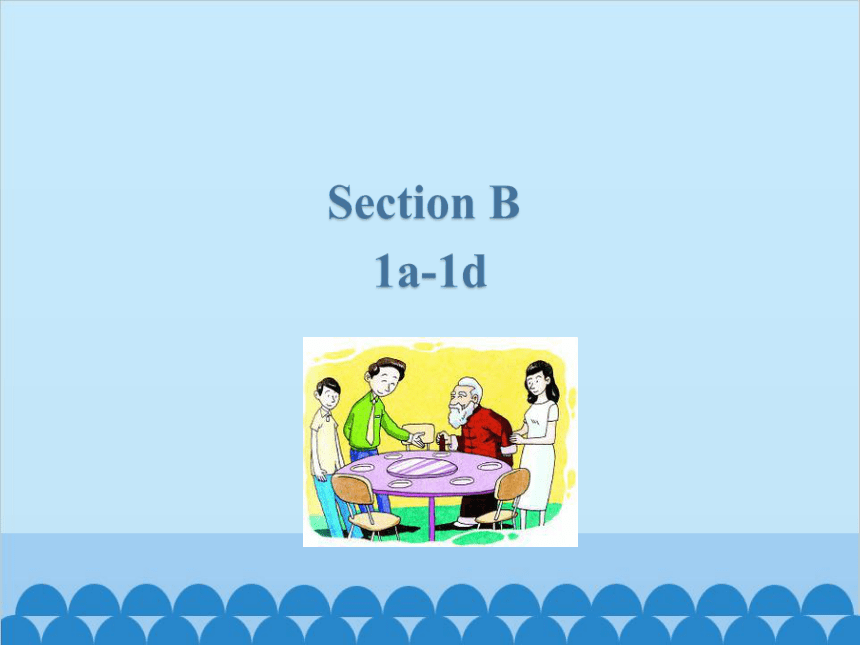 | |
| 格式 | pptx | ||
| 文件大小 | 1.1MB | ||
| 资源类型 | 教案 | ||
| 版本资源 | 人教新目标(Go for it)版 | ||
| 科目 | 英语 | ||
| 更新时间 | 2023-11-06 09:49:32 | ||
图片预览

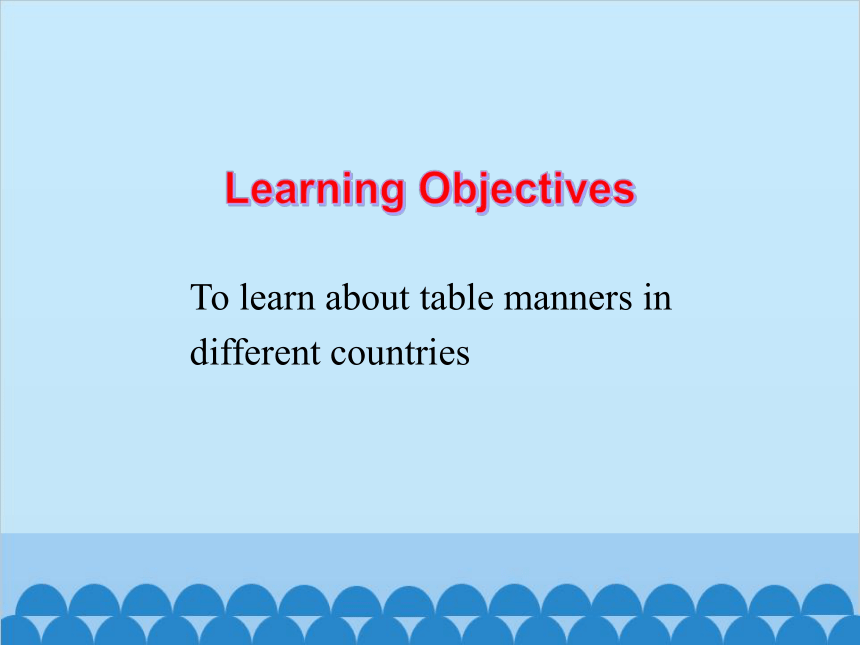
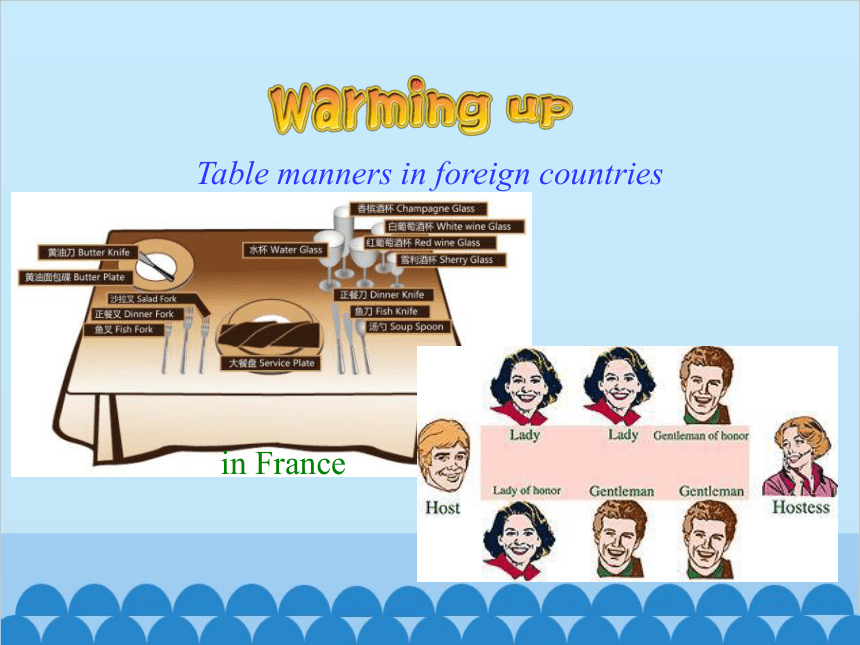
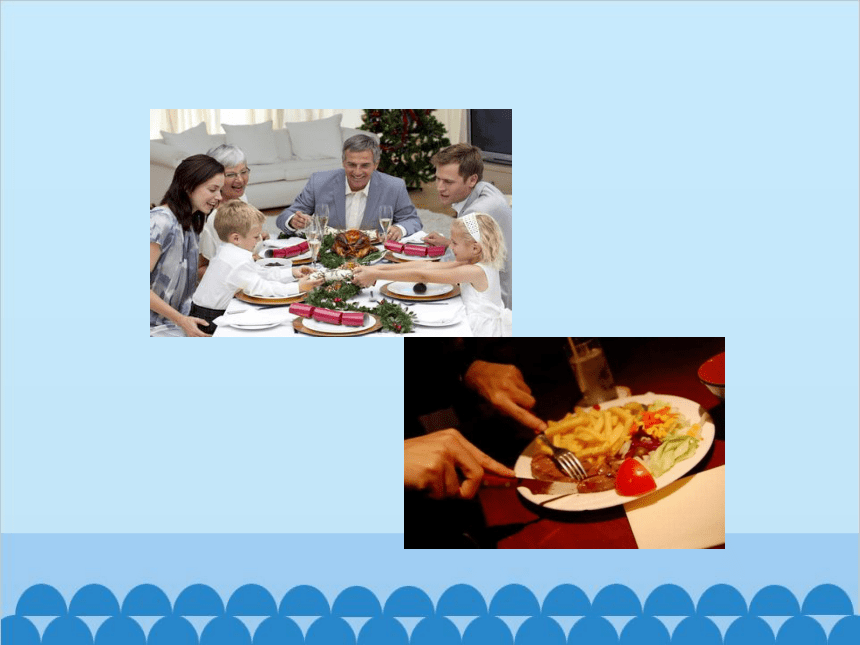
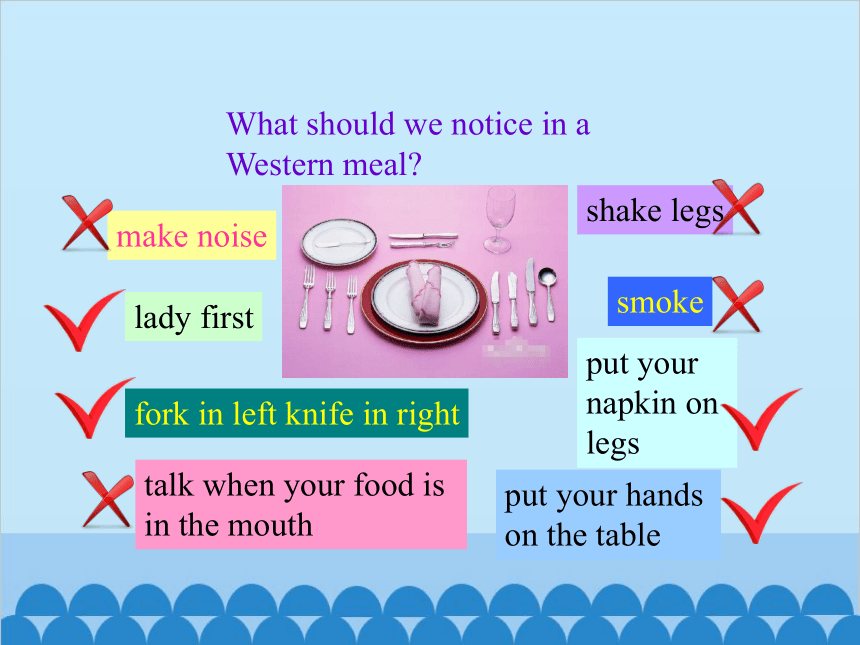
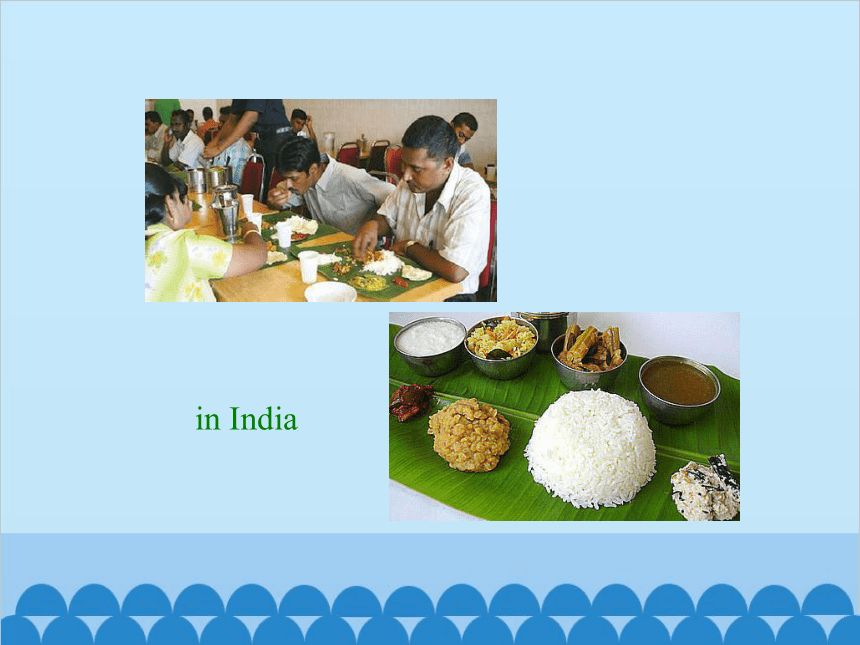

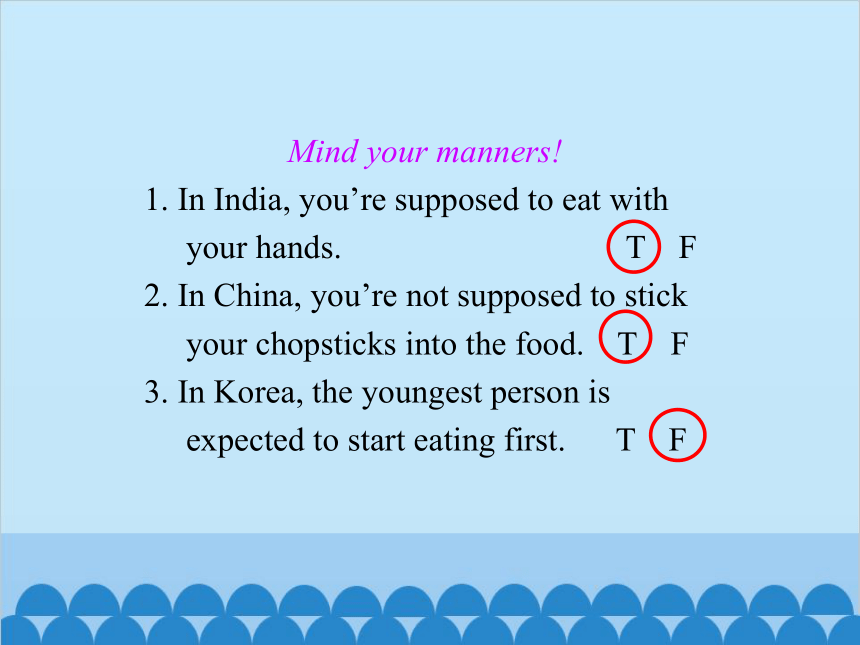
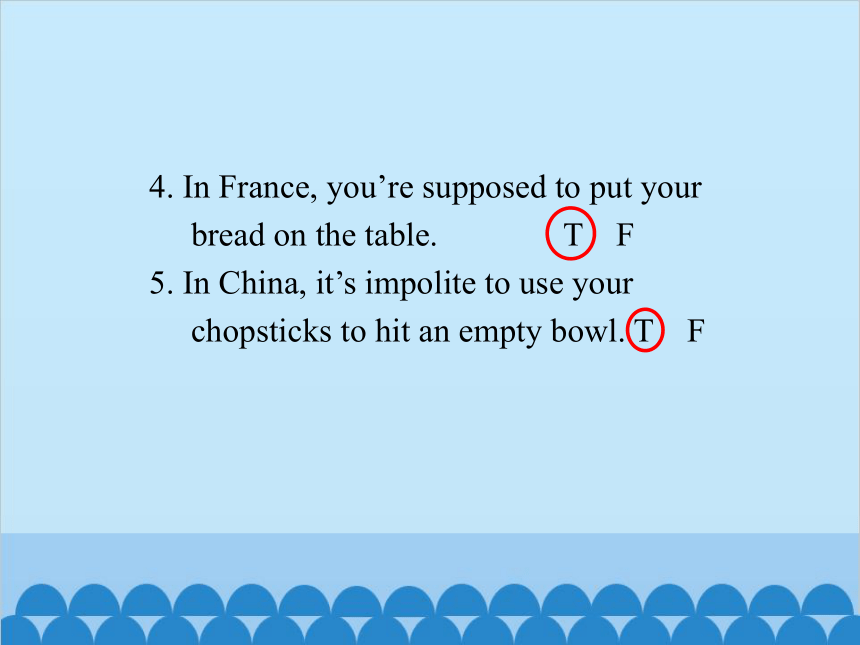
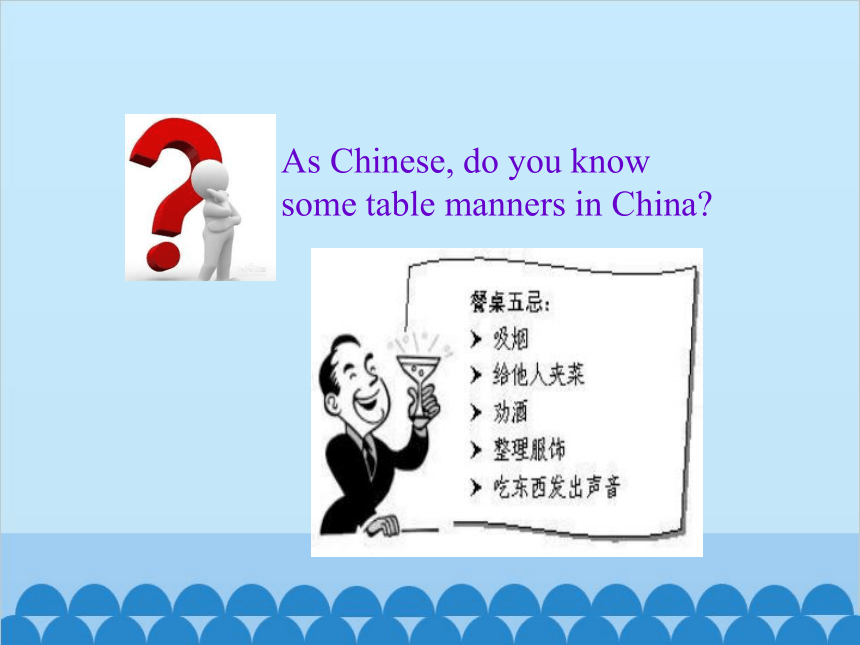
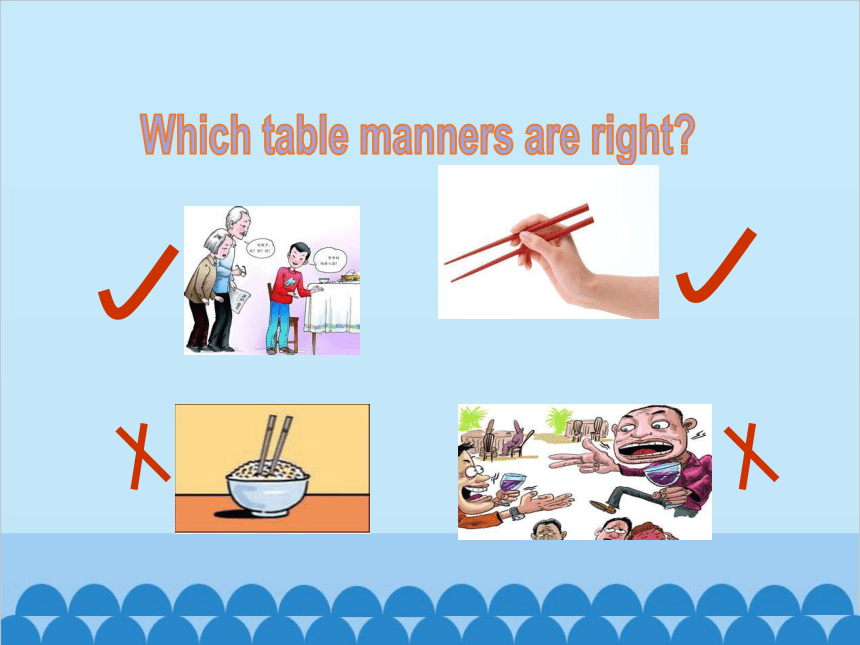
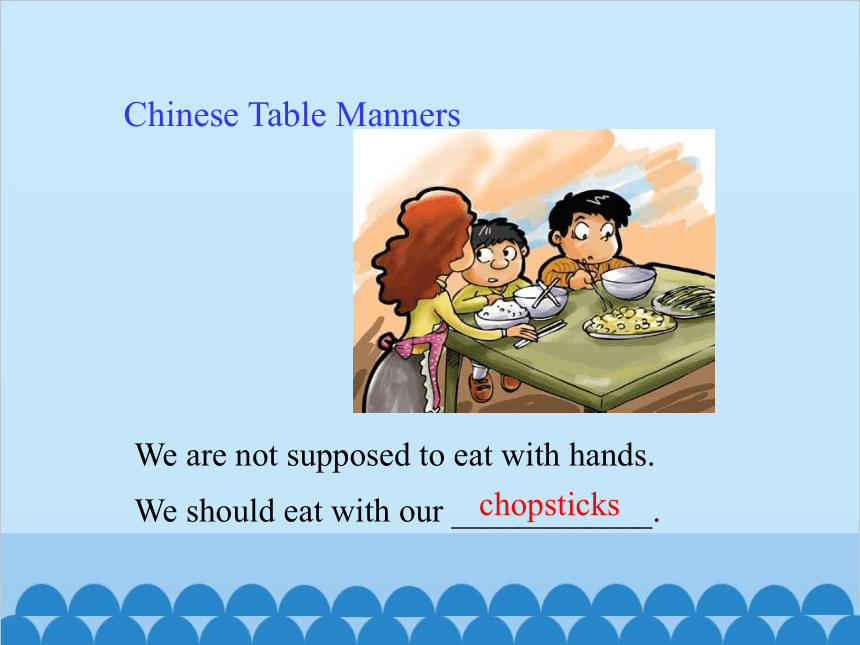
文档简介
(共30张PPT)
Section B
1a-1d
To learn about table manners in different countries
Learning Objectives
Table manners in foreign countries
in France
What should we notice in a Western meal
make noise
put your hands on the table
talk when your food is in the mouth
lady first
fork in left knife in right
smoke
shake legs
put your napkin on legs
in India
1a
How much do you know about table manners around the world Take the following quiz. Circle T for true or F for false after each sentence.
Mind your manners!
1. In India, you’re supposed to eat with your hands. T F
2. In China, you’re not supposed to stick your chopsticks into the food. T F
3. In Korea, the youngest person is expected to start eating first. T F
4. In France, you’re supposed to put your bread on the table. T F
5. In China, it’s impolite to use your chopsticks to hit an empty bowl. T F
As Chinese, do you know
some table manners in China
Which table manners are right
Chinese Table Manners
We are not supposed to eat with hands.
We should eat with our ____________.
chopsticks
It’s rude to _____ the chopsticks ____
the food.
We’re not supposed to __________ at
the table.
stick
into
talk aloud
Do you know what other table manners in China
We shouldn’t ________ others while eating the meals. (指)
point at
We aren’t supposed to __________ while eating the meals. (发出响声)
make noise
1
2
3
Listening
1b
Steve is going to China to study. His friend Yang Ming is telling him about the table manners in China. Listen and number the pictures in the order you hear them.
Listen again. Match these sentence parts.
____ 1. You’re not supposed to… ____ 2. It’s impolite to… ____ 3. You shouldn’t… a. stick your chopsticks into your food.
b. point at anyone with your chopsticks.
c. start eating first if there are older people at the table.
a
c
b
1c
Listen for the third time, then complete the conversation.
Yang Ming: You must be excited about _______________ tomorrow, Steve!
Steve: Yeah, but I’m a little _______, too.
Yang Ming: Why
Steve: Well, for one thing, I don’t know ___________________ very well… and I don’t know how to _______ at the dinner table.
leaving for China
nervous
how to use chopsticks
behave
Yang Ming: Oh, I see. Well, one important thing is that you _________________ start eating first if there are ___________ at the table.
Steve: That’s _________. In the United States, it doesn’t matter.
Yang Ming: Yeah, I know. It’s also _______ to stick your chopsticks into your food. You ______________________ with your chopsticks, either.
are not supposed to
older people
impolite
shouldn’t point at anyone
interesting
Steve: Oh, OK.
Yang Ming: Oh, and there’s one more thing you need to know. You’re not supposed to __________________________. Only parents ______________ talk at the dinner table. Children are not allowed to _____.
Steve: Wow! That’s… that’s unusual!
Yang Ming: Haha, I’m just _______!
talk when you’re eating dinner
are expected to
speak
kidding
A: We are supposed to…
B: Yes, and it’s impolite to…
Discussion
Talk about other table manners in your country.
1d
Talk about Chinese table manners in group of four and write down your opinions.
1. You’re not supposed to start eating first
if there are older people at the table.
2. You shouldn’t point at anyone with
your chopsticks.
3. It’s impolite to stick your chopsticks
into your food.
4. It’s impolite to use your chopsticks
to hit a bowl.
5. You are not supposed to talk when
you’re having dinner.
7. It’s impolite to make a big noise when you are eating soup.
Mind your manners!
mind…是一个警示句型,“注意……;
当心;小心……”。
e.g. Mind your head, please.
请注意你的头。
Explanation
v. “介意”,常用于否定句和疑问句,后接名词(短语)、代词、动词-ing形式或从句。
单项填空。
1. I don’t _______ the heat, for I’m used
to hot weather.
A. like B. mind
C. know D. stand
B
2. I wouldn’t mind _____ a roommate. We can help each other and save money as well.
A. having B. to have
C. have D. had
A
manners“礼貌;规矩;礼节;礼仪”,此
时,manner通常用复数形式。
e.g. 满嘴食物说话是不礼貌的行为。
It’s a bad manner to talk with your
mouth full.
把筷子插进食物里
stick your chopsticks into the food
用你的筷子敲空碗
use your chopsticks to hit an empty bowl
用筷子指着任何人
point at anyone with your chopsticks
Summary
1. Find the differences between France and China
about the table manners on the Internet.
2. Preview the new words and expressions
we will learn in next lesson.
Section B
1a-1d
To learn about table manners in different countries
Learning Objectives
Table manners in foreign countries
in France
What should we notice in a Western meal
make noise
put your hands on the table
talk when your food is in the mouth
lady first
fork in left knife in right
smoke
shake legs
put your napkin on legs
in India
1a
How much do you know about table manners around the world Take the following quiz. Circle T for true or F for false after each sentence.
Mind your manners!
1. In India, you’re supposed to eat with your hands. T F
2. In China, you’re not supposed to stick your chopsticks into the food. T F
3. In Korea, the youngest person is expected to start eating first. T F
4. In France, you’re supposed to put your bread on the table. T F
5. In China, it’s impolite to use your chopsticks to hit an empty bowl. T F
As Chinese, do you know
some table manners in China
Which table manners are right
Chinese Table Manners
We are not supposed to eat with hands.
We should eat with our ____________.
chopsticks
It’s rude to _____ the chopsticks ____
the food.
We’re not supposed to __________ at
the table.
stick
into
talk aloud
Do you know what other table manners in China
We shouldn’t ________ others while eating the meals. (指)
point at
We aren’t supposed to __________ while eating the meals. (发出响声)
make noise
1
2
3
Listening
1b
Steve is going to China to study. His friend Yang Ming is telling him about the table manners in China. Listen and number the pictures in the order you hear them.
Listen again. Match these sentence parts.
____ 1. You’re not supposed to… ____ 2. It’s impolite to… ____ 3. You shouldn’t… a. stick your chopsticks into your food.
b. point at anyone with your chopsticks.
c. start eating first if there are older people at the table.
a
c
b
1c
Listen for the third time, then complete the conversation.
Yang Ming: You must be excited about _______________ tomorrow, Steve!
Steve: Yeah, but I’m a little _______, too.
Yang Ming: Why
Steve: Well, for one thing, I don’t know ___________________ very well… and I don’t know how to _______ at the dinner table.
leaving for China
nervous
how to use chopsticks
behave
Yang Ming: Oh, I see. Well, one important thing is that you _________________ start eating first if there are ___________ at the table.
Steve: That’s _________. In the United States, it doesn’t matter.
Yang Ming: Yeah, I know. It’s also _______ to stick your chopsticks into your food. You ______________________ with your chopsticks, either.
are not supposed to
older people
impolite
shouldn’t point at anyone
interesting
Steve: Oh, OK.
Yang Ming: Oh, and there’s one more thing you need to know. You’re not supposed to __________________________. Only parents ______________ talk at the dinner table. Children are not allowed to _____.
Steve: Wow! That’s… that’s unusual!
Yang Ming: Haha, I’m just _______!
talk when you’re eating dinner
are expected to
speak
kidding
A: We are supposed to…
B: Yes, and it’s impolite to…
Discussion
Talk about other table manners in your country.
1d
Talk about Chinese table manners in group of four and write down your opinions.
1. You’re not supposed to start eating first
if there are older people at the table.
2. You shouldn’t point at anyone with
your chopsticks.
3. It’s impolite to stick your chopsticks
into your food.
4. It’s impolite to use your chopsticks
to hit a bowl.
5. You are not supposed to talk when
you’re having dinner.
7. It’s impolite to make a big noise when you are eating soup.
Mind your manners!
mind…是一个警示句型,“注意……;
当心;小心……”。
e.g. Mind your head, please.
请注意你的头。
Explanation
v. “介意”,常用于否定句和疑问句,后接名词(短语)、代词、动词-ing形式或从句。
单项填空。
1. I don’t _______ the heat, for I’m used
to hot weather.
A. like B. mind
C. know D. stand
B
2. I wouldn’t mind _____ a roommate. We can help each other and save money as well.
A. having B. to have
C. have D. had
A
manners“礼貌;规矩;礼节;礼仪”,此
时,manner通常用复数形式。
e.g. 满嘴食物说话是不礼貌的行为。
It’s a bad manner to talk with your
mouth full.
把筷子插进食物里
stick your chopsticks into the food
用你的筷子敲空碗
use your chopsticks to hit an empty bowl
用筷子指着任何人
point at anyone with your chopsticks
Summary
1. Find the differences between France and China
about the table manners on the Internet.
2. Preview the new words and expressions
we will learn in next lesson.
同课章节目录
- Unit 1 How can we become good learners.
- Section A
- Section B
- Unit 2 I think that mooncakes are delicious!
- Section A
- Section B
- Unit 3 Could you please tell me where the restroom
- Section A
- Section B
- Unit 4 I used to be afraid of the dark.
- Section A
- Section B
- Unit 5 What are the shirts made of?
- Section A
- Section B
- Review of Units 1-5
- Unit 6 When was it invented?
- Section A
- Section B
- Unit 7 Teenagers should be allowed to choose their
- Section A
- Section B
- Unit 8 It must belong to Carla.
- Section A
- Section B
- Unit 9 I like music that I can dance to.
- Section A
- Section B
- Unit 10 You're supposed to shake hands.
- Section A
- Section B
- Review of Units 6-10
- Unit 11 Sad movies make me cry.
- Section A
- Section B
- Unit 12 Life is full of the unexpected
- Section A
- Section B
- Unit 13 We're trying to save the earth!
- Section A
- Section B
- Unit 14 I remember meeting all of you in Grade 7.
- Section A
- Section B
- Review of Units 11-14
